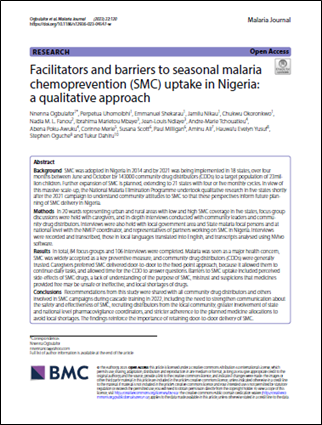A new publication discusses facilitators and barriers to uptake of seasonal malaria chemoprevention (SMC) in Nigeria. This is related to the OPT-SMC project on optimizing SMC implementation in 13 sub-Saharan African countries.
Seasonal malaria chemoprevention (SMC) involves monthly administration of the antimalarials sulfadoxine-pyrimethamine and amodiaquine to all children aged under six years during the malaria season. Following a 2012 WHO recommendation, 13 sub-Saharan African countries (Burkina Faso, Cameroon, Chad, Gambia, Ghana, Guinea, Guinea Bissau, Mali, Mauritania, Niger, Nigeria, Senegal and Togo) with high seasonal malaria transmission have adopted and integrated SMC into their policy documents and strategic plans.
SMC was adopted in Nigeria in 2014 and by 2021 was being implemented in 18 states, over four months between June and October by 143 000 community drug distributors (CDDs) to a target population of 23 million children. Further expansion of SMC is planned, extending to 21 states with four or five monthly cycles. In view of this massive scale-up, the National Malaria Elimination Programme undertook qualitative research in five states shortly after the 2021 campaign to understand community attitudes to SMC so that these perspectives inform future planning of SMC delivery in Nigeria.
Click here for the full publication in Malaria Journal.


